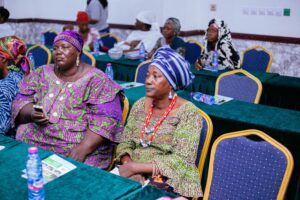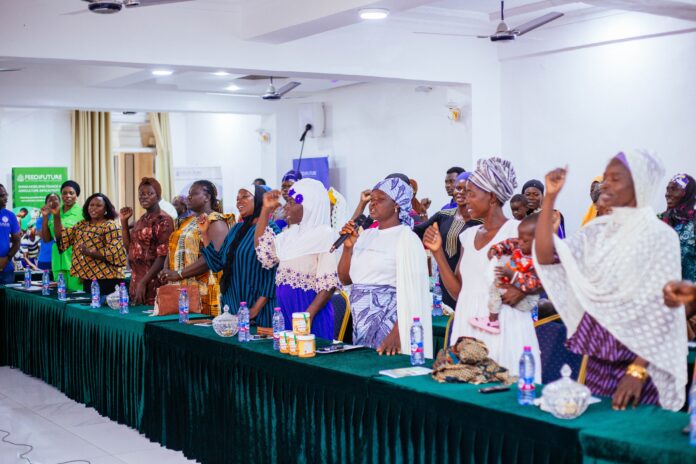In a pivotal policy dialogue event commemorating the International Day of Rural Women in Wa, Upper West Region, Fidelis Dadzie, deputy Chief of Party, Mobilising Finance in Agriculture Activities, showcased the extraordinary support extended to over 40,000 businesses.
“Our mission is straightforward. We advocate for improvements that farmers can make. We work in collaboration with financial institutions and other advisory bodies to address issues related to financial access. Today we’re delighted to have supported over 40,000 businesses, with 24,000 of them being women – which is a significant achievement. We’re here to celebrate the remarkable presence and influence of women in our region who are changing perceptions and making positive impacts in their communities,” Mr. Dadzie said.
Mr. Dadzie emphasised that lending to women results in wise investments, creating a positive environment. “The women we’ve worked with have shown that when you lend to a woman, she will invest wisely and share her earnings; fostering a positive environment in contrast to the prevailing fear and uncertainty.

“Your influence has been instrumental in shifting the financing landscape and empowering communities. VSL groups have emerged as a vital part of this transformation, teaching banks and financial institutions how to improve their services and products.”
The event, themed ‘Shaping Ghana’s agricultural future: the role of rural women’, was organised in collaboration with USAID/Ghana and its implementing partners under the Feed the Future initiative – Policy LINK, Mobilising Finance in Agriculture (MFA) and Market Systems Resilience (MSR), along with the Ministry of Food and Agriculture Women in Agricultural Development Directorate (WIAD).
The commemoration aims to amplify rural women’s efforts by emphasising their pivotal roles, inspiring others and fostering a change in mindset and behaviour towards women in agriculture.
The International Day for Rural Women is celebrated annually on October 15th. This day aims to recognise the crucial role rural women play in enhancing agricultural and rural development, improving food security and eradicating rural poverty.
Rural women often make significant contributions to their communities and families through activities such as farming, small-scale businesses and household responsibilities. The International Day for Rural Women provides an opportunity to highlight their achievements, challenges, and the need for gender equity in rural areas.

Yunus Abdulai, Country Lead-Feed the Future Ghana Policy LINK, has affirmed the project’s long-term commitment to supporting women in agriculture. He highlighted that this support will be extended through strategic collaborations with the Ministry of Food and Agriculture and other stakeholders, aiming to enhance the inclusion and active participation of women in agricultural policy systems.
“In April of this year, Policy LINK took a significant step by supporting 20 women awardees from the 2022 National Farmers’ Day celebrations. As part of the project’s award package, these women received training in leadership, financial management and personal initiative skills. This initiative has yielded remarkable results, as the women awardees have come together to form the Ghana Association of Female Agriculture and Fish Farming Award Winners (GAFAFAW). GAFAFAW’s mission is to raise awareness and empower women in agriculture, encouraging their active contribution to agricultural policy systems.”
Rashida Iddrisu, a key figure of Women in Agricultural Development at the Wa Regional Department of Agriculture, commented on Ghana’s substantial strides in agriculture. However, she emphasised the critical need to unlock the untapped potential of rural women. She noted: “Ghana has made commendable progress in agricultural development, but there is still much work to be done. By harnessing the untapped potential of rural women, we can accelerate this progress and create a more inclusive, sustainable and prosperous future for all Ghanaians. Rural women, through their dedication and hard work, can contribute to increased agricultural productivity, improved food security and enhanced rural livelihoods”.










